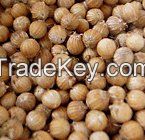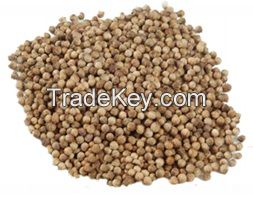Product Description
English Name: Coriander
Seeds
Botanical Name: Coriandrum
Sativum
Description:
Conventional
Coriander seeds
nutrition facts
Have you ever caught up with gripping stomach pain? Drinking a few
sips of extraction obtained from coriander seeds, dill, caraway,
fennel, and aniseed from your granny's kitchen spice-box perhaps
would be the most efficient carminative remedy for this
ailment!
Coriander is a small, hollow-stemmed plant in the Apiaceae family,
in the genus: Coriandrum. Its scientific name is Coriandrum
sativum. Pleasant, aromatic and spicy, its seeds have been found
utility since ancient times in cooking as well as in various
traditional medicines.
Coriander is native to South-Eastern Europe and grown extensively
all over the Europe, Middle East, China, India, and Turkey. It is
recognized as cilantro in the west. This herbaceous plant grows up
to 2 feet in height with branching stems, featuring deep-green
soft, hairless bi-lobe or tri-lobed leaves. The mature plant bears
small light pink color flowers that subsequently turn into globular
or oval-shaped fruits (seeds). The seeds measure about 4-6 mm in
diameter with a central hollow cavity containing two vertical
vittae containing some important essential oils.
Coriander seeds can be ready for harvest when the plant turn brown,
and its leaves begin to dry and fall. Immature seeds are light
green and taste bitter. To harvest; cut the crop, tie in small
bundles, and sun-dry for several days. Traditionally, to separate
the seeds, either the sheaves beaten with a stick or a lightweight
roller employed to wear off the pods.
Health benefits
of coriander seeds
Coriander seeds possess many plant-derived chemical compounds that
known to have been antioxidant, disease preventing, and health
promoting properties.
The unique aromatic flavor of coriander seeds comes from
their essential volatile oils and fatty acids. Some important fatty
acids in the dried seeds include petroselinic acid, linoleic acid
(omega 6), oleic acid, and palmitic acid. Also, the seeds contain
essential oils such as linalool (68%), a-pinene (10%), geraniol,
camphene, terpene, etc. Together; these active principles are
responsible for digestive, carminative, and anti-flatulent
properties of the seeds.
As in other spices, coriander is also rich in dietary fiber.
100 g seeds provide 41.9 g of fiber, much of this is metabolically
inert insoluble content. Dietary fiber increases the bulk of the
food by absorbing water throughout the digestive system and thus
aids in smooth bowel movements.
Moreover, dietary fibers bind to bile salts (produced from
cholesterol) and decrease their re-absorption in the colon, thus
help lower serum LDL-cholesterol levels. Together with flavonoid
antioxidants, fiber composition of coriander helps protect colon
mucosa from cancers.
Its seeds are an excellent source of minerals like iron,
copper, calcium, potassium, manganese, zinc and magnesium. Copper
is essential for the production of red blood cells. Iron is
essential for cell metabolism and red blood cell formation. Zinc is
a co-factor in many enzymes that regulate growth and development,
sperm generation, digestion and nucleic acid synthesis. Potassium
is an important component of cell and body fluids that helps
controlling heart rate and blood pressure. The human body utilizes
manganese as a cofactor for the important antioxidant enzyme
superoxide dismutase.
Unlike other dry spice seeds that lack in vitamin-C,
coriander seeds contain an ample amount of this antioxidant
vitamin. 100 g of dry seeds provide 21 mg or 35% of RDI of
vitamin-C.
Furthermore, the seeds are the storehouse of many vital
B-complex vitamins like thiamin, riboflavin, and niacin.
Selection and
storage
Coriander seeds as well as its oil can be readily available in the
markets year around. The seeds used as a spice. Good-quality
coriander seeds should release pleasant, slightly peppery flavor
when squeezed between index and thumb fingers. In the store, buy
whole seeds instead of coriander powder since oftentimes it may
contain an adulterated spicy mix.
At home, store seeds in cool, dry, dark place, in airtight
containers. This way, they keep well for many months and can be
milled using a hand mill whenever required. Ground or powdered
coriander should be stored in airtight containers and placed in the
refrigerator. Use this spice powder as early as possible since it
loses its flavor rather quickly due to evaporation of essential
oils.
Culinary
uses
Dried coriander seeds are one of the common spice ingredients used
worldwide. In general, completely dried seeds gently roasted under
low flame just before milling to get a fine powder. Roasting brings
out specific aromatic compounds and essential oils in the
seeds.
Here are some
serving methods:
- Coriander seeds used as flavoring agent in confectionery, stews,
sausages, sweetbreads, and cakes.
- Coriander leaves, as well as seeds, are being used as an aromatic
spice in Chinese, Indian, Pakistani, Middle-eastern and European
cooking.
- Russian dark rye bread, "Borodinsky bread" uses coriander
seeds.
- In India, ground powder of coriander seeds is a common household
spice powder that is used in pickling, chutneys, stews, curries,
marinades as well as in sausages.
Medicinal
uses
- Along with dill, and fennel, coriander seeds employed as a
carminative and digestive item in a variety of gripe water
preparations.
- The seeds are chewed as a remedy to prevent halitosis (unpleasant
breath).
Safety
profile
In smaller doses, coriander seeds have no known adverse effects on
health. They can be safely used by pregnant as well as nursing
mothers.

| Country: |
Morocco |
| Model No: |
AD2001
|
| FOB Price: |
( Negotiable ) (Negotiable)
Get Latest Price
|
| Place of Origin: |
Morocco |
| Price for Minimum Order: |
- |
| Minimum Order Quantity: |
- |
| Packaging Detail: |
PP Bag |
| Delivery Time: |
7 to 30 days depends on Order |
| Supplying Ability: |
- |
| Payment Type: |
Money Gram, Western Union, L/C, T/T |
| Product Group : |
- |



